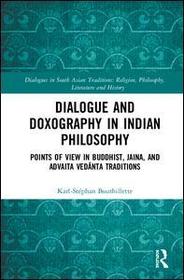
Dialogue and Doxography in Indian Philosophy
Points of View in Buddhist, Jaina, and Advaita Vedānta Traditions
Sorozatcím: Dialogues in South Asian Traditions: Religion, Philosophy, Literature and History;
-
20% KEDVEZMÉNY?
- A kedvezmény csak az 'Értesítés a kedvenc témákról' hírlevelünk címzettjeinek rendeléseire érvényes.
- Kiadói listaár GBP 145.00
-
69 273 Ft (65 975 Ft + 5% áfa)
Az ár azért becsült, mert a rendelés pillanatában nem lehet pontosan tudni, hogy a beérkezéskor milyen lesz a forint árfolyama az adott termék eredeti devizájához képest. Ha a forint romlana, kissé többet, ha javulna, kissé kevesebbet kell majd fizetnie.
- Kedvezmény(ek) 20% (cc. 13 855 Ft off)
- Kedvezményes ár 55 419 Ft (52 780 Ft + 5% áfa)
Iratkozzon fel most és részesüljön kedvezőbb árainkból!
Feliratkozom
69 273 Ft

Beszerezhetőség
Becsült beszerzési idő: A Prosperónál jelenleg nincsen raktáron, de a kiadónál igen. Beszerzés kb. 3-5 hét..
A Prosperónál jelenleg nincsen raktáron.
Why don't you give exact delivery time?
A beszerzés időigényét az eddigi tapasztalatokra alapozva adjuk meg. Azért becsült, mert a terméket külföldről hozzuk be, így a kiadó kiszolgálásának pillanatnyi gyorsaságától is függ. A megadottnál gyorsabb és lassabb szállítás is elképzelhető, de mindent megteszünk, hogy Ön a lehető leghamarabb jusson hozzá a termékhez.
A termék adatai:
- Kiadás sorszáma 1
- Kiadó Routledge
- Megjelenés dátuma 2020. április 28.
- ISBN 9780367226138
- Kötéstípus Keménykötés
- Terjedelem222 oldal
- Méret 234x156 mm
- Súly 453 g
- Nyelv angol
- Illusztrációk 10 Illustrations, black & white 57
Kategóriák
Rövid leírás:
This is the first book fully dedicated to Indian philosophical doxography. It looks at Indian doxography both as a witness of inter and intra sectarian dialogues, and as a religious phenomenon.
TöbbHosszú leírás:
This is the first book fully dedicated to Indian philosophical doxography. It examines the function such dialectical texts were intended to serve in the intellectual and religious life of their public. It looks at Indian doxography both as a witness of inter- and intra-sectarian dialogues and as a religious phenomenon. It argues that doxographies represent dialectical exercises, indicative of a peculiar religious attitude to plurality, and locate these ‘exercises’ within a known form of ‘yoga’ dedicated to the cultivation of ‘knowledge’ or ‘gnosis’ (jñāna).
Concretely, the book presents a critical examination of three Sanskrit doxographies: the Madhyamakahṛdayakārikā of the Buddhist Bhāviveka, the Ṣaḍdarśanasamuccaya of the Jain Haribhadra, and the Sarvasiddhāntasaṅgraha attributed to the Advaitin Śaṅkara, focusing on each of their respective presentation of the Mīmāṃsā view.
It is the first time that the genre of doxography is considered beyond its literary format to ponder its performative dimension, as a spiritual exercise. Theoretically broad, the book reaches out to academics in religious studies, Indian philosophy, Indology, and classical studies.
"[This book] puts forward an innovative and attractive argument that the Indian doxographies he studies are not "objective" summaries of different contemporary Indian schools nor simply mnemonic forms for learning about and ranking one's opponents, but are rather pedagogical devices intended to draw the pupil towards an understanding of reality which surpasses conceptual formulations."
-Jacqueline G. Suthren Hirst,Journal of Dharma Studies
TöbbTartalomjegyzék:
Acknowledgements;
Preface;
Introduction;
1 The beginnings of Mādhyamika doxography: Bhāviveka’s MHK;
2 The beginnings of Jaina doxography: Haribhadra’s ṢDS;
3 The beginnings of Advaita doxography: Śaṅkara’s SSS;
Conclusion;
Bibliography;
Index
Több





